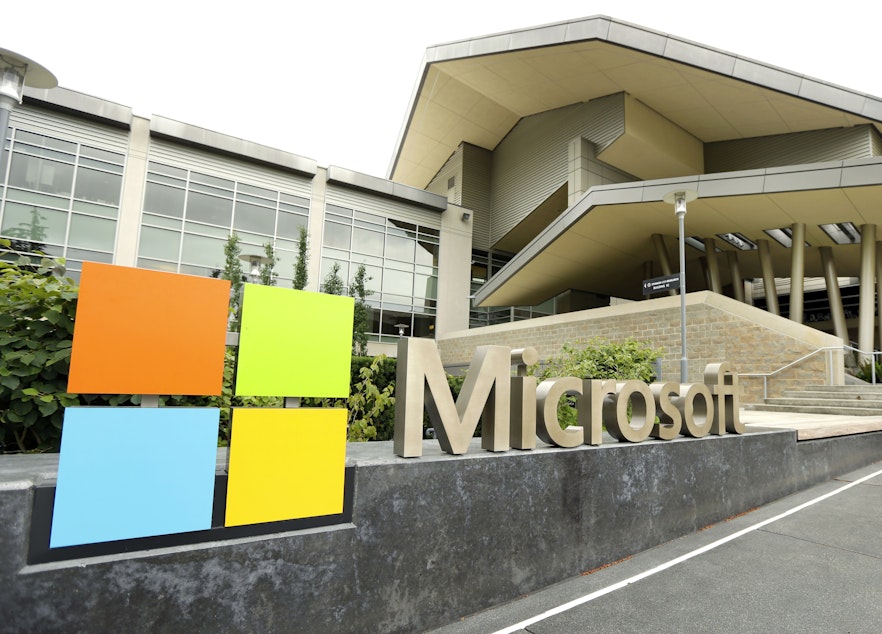Pentagon cancels Microsoft's massive JEDI contract

A high-stakes battle over a $10 billion military contract took another twist today. The Department of Defense announced it is canceling the JEDI contract with Microsoft, which had been selected to provide cloud computing services for the U.S. military. The contract was coveted by both Microsoft and Amazon.
Officially, the Pentagon says it canceled JEDI "due to evolving requirements and industry advances." Taylor Soper is the managing editor at GeekWire. He says that may be the Pentagon's official reason, but it's more complicated.
This interview has been edited for clarity.
Taylor Soper: The underlying story here really is that there is an ongoing legal challenge by Amazon. The company is alleging that there were problems with the bidding process, that there were influences that weren't legal. That looked like he was going to continue for months, if not years.
I think that DOD was kind of in a tough position. They need to improve their technology, they need to protect this country, and they saw that this legal challenge was going to continue. So they said goodbye to JEDI, and it ends quite a saga that involved two of the big tech giants right here in our backyard.
Kim Malcolm: Can you remind us why the JEDI contract was such a big deal in the first place?
This is one of the largest IT procurements in U.S. history. $10 billion is obviously a huge number. It was a massive project to migrate the Pentagon's computing infrastructure and data to the cloud. The fact that they decided that it was going to go to a single vendor sparked a lot of controversy from the very beginning. JEDI has been clouded in controversy since 2018.
Sponsored
Amazon was largely seen as the front-runner. Amazon Web Services is the market leader in the infrastructure cloud computing market. Other companies knew that. Not just Microsoft, but other companies like IBM and Oracle complained about the bidding format. They filed formal protests. Once the award was given to Microsoft, Amazon came back immediately with their own legal challenges. So this has been a very unusual process for a government contract that really illuminates the power of big tech, and how competitive and fierce it can be between these giant companies.
Some of Amazon's concerns after the contract was awarded had to do with then-President Trump and what he was saying publicly.
A big part of this whole feud, or at least part of Amazon's annoyance with the process, is how former President Trump was or wasn't involved. Amazon alleges that Trump had too much influence over the decision to give the contract to Microsoft. That was part of the back and forth in the legal challenges. Amazon wanted to basically bring former President Trump in and question him as part of this process. So I think the DOD just said, hey, it's time to start over.
How is Microsoft responded to the news today?
Microsoft came out with a pretty civil response. They said they respected and understood the decision. They basically were saying the security of the U.S. is more important than a single contract. No doubt over in Redmond they're disappointed. This was a huge $10 billion contract that was going to go to them and their growing cloud computing arm, Azure, which is really helping the company grow quickly.
Sponsored
Amazon also came out with their own statement. They said, “Unfortunately, the contract award was not based on the merits of the proposals, and instead was the result of outside influence.” So there's a lot of these underlying messages in these official statements. But man, it was a fierce and very public battle between Amazon and Microsoft. Both companies, every time something new would happen in the courts, or news would happen, they issued these statements going after each other. That looks like maybe it'll come to an end.
You kind of alluded to this before. There could be quite a few winners coming out of this now in this new landscape.
Correct. The DOD said today that they will put out a new contract called Joint Warfighter Cloud Capability, JWCC. So we're going from JEDI to JWCC, which doesn't sound quite as cool. They've already said that it's going to be a multi-vendor contract, meaning it's going to go to multiple companies. It's expected to go to both Microsoft and Amazon, and potentially other companies.
The underlying strategy here, perhaps, seems to be let's avoid legal challenges from companies that don't get the contract, especially if you make it a single vendor contract. So it looks like both companies will have a bite at that. It's a heck of a first day for Andy Jassy, the new Amazon CEO, who replaced Jeff Bezos literally yesterday. He formerly ran Amazon Web Services for several years.
Listen to the interview by clicking the play button above.





